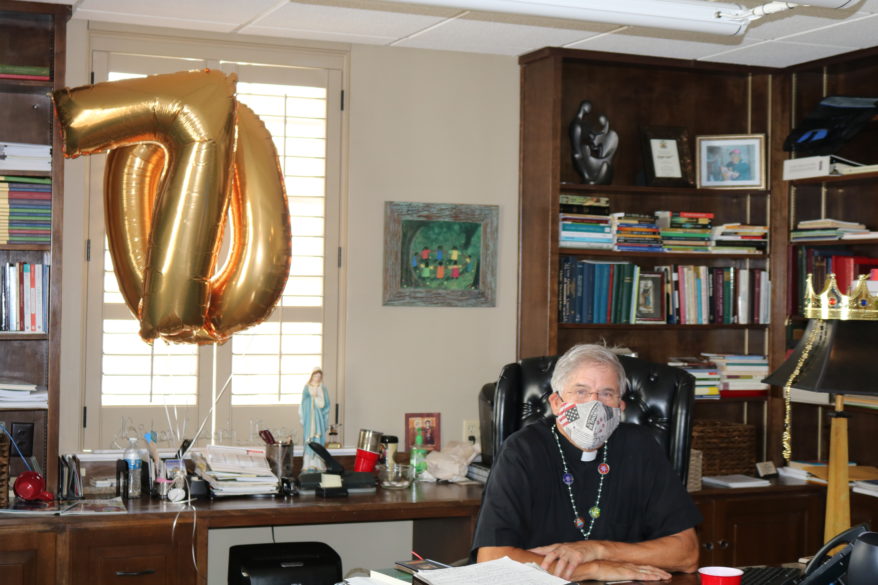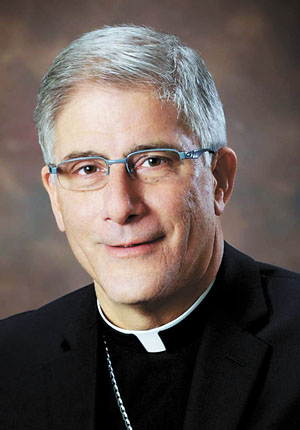“La conciencia es la voz de Dios que resuena en el corazón humano, nos revela la verdad y nos llama a hacer el bien mientras rechazamos lo que es malo.”
– Ciudadanía Fiel
Por Obispo Joseph R. Kopacz, D.D.
Con elecciones en el horizonte cercano, a nivel nacional, estatal y local, la Iglesia Católica en los Estados Unidos, una vez más, participa activamente en el proceso político para promover el bien común: una cultura de vida, justicia y paz. Hay una división obvia en la iglesia y en la nación sobre los candidatos y los temas, quizás más estridente hoy en día, pero ciertamente nada nuevo. Las redes sociales y el ciclo de noticias de 24 horas avivan incesantemente sobre los fuegos del partidismo las brasas que con tanta intensidad arden, tal como los fuegos que consumen millones de millas cuadradas en los estados del oeste. Desafortunadamente, entonces, la política en nuestro país a menudo puede ser una competencia de intereses poderosos, ataques partidistas, fragmentos de sonido y exageración de los medios. Sin embargo, como nos recuerda el Papa Francisco, “la política, aunque a menudo denigrada, sigue siendo una vocación elevada y una de las formas más elevadas de caridad en la medida en que busca el bien común”. Con este espíritu, la iglesia busca ser una brújula confiable para votar en noviembre, un llamado a la fe y la razón en la quietud de la conciencia de cada uno.

En esta edición del periódico, usted puede encontrar número la introducción al documento de los obispos, titulado “Ciudadanía Fiel” (Faithful Citizenship, por su nombre en inglés). Es un documento, refinado durante décadas de ciclos electorales, que se ha forjado en el fuego de la verdad del Evangelio y la enseñanza de la iglesia durante casi 2000 años. Los obispos afirman: “La comunidad católica aporta importantes activos al diálogo político sobre el futuro de nuestra nación. Traemos un marco moral consistente, extraído de la razón humana básica que está iluminado por las Escrituras y la enseñanza de la iglesia, para evaluar problemas, plataformas políticas y campañas. También aportamos una amplia experiencia en el servicio a los necesitados y la educación de los jóvenes.” Desde esta abundante y fructífera tradición de fe, educación y acción social, el Catecismo de la Iglesia Católica nos recuerda: “Es necesario que todos participen, cada uno según su posición y función, en la promoción del bien común… En la medida de lo posible los ciudadanos deben participar activamente en la vida pública.” CCC 1913-15
“En esta declaración, los obispos no pretendemos decirles a los católicos por quién o contra quién votar. Nuestro propósito es ayudar a los católicos a formar su conciencia de acuerdo con la verdad de Dios. Reconocemos que la responsabilidad de tomar decisiones en la vida política recae en cada individuo a la luz de una conciencia debidamente formada, y que la participación va mucho más allá de emitir un voto en una elección en particular.”
Ciudadanía Fiel afirma, además, “La conciencia es la voz de Dios que resuena en el corazón humano, nos revela la verdad y nos llama a hacer el bien mientras rechazamos lo que es malo. Finalmente, la reflexión orante es fundamental para discernir la voluntad de Dios”. El clero y los laicos tienen roles complementarios en la vida pública. Los obispos tenemos la responsabilidad primordial de transmitir la doctrina moral y social de la Iglesia, y como enseñó el Papa Benedicto en Deus Caritas Est, “El deber directo de trabajar por un orden justo de la sociedad es propio de los fieles laicos.” #29
Para formar conciencias y promover un ordenamiento justo de la sociedad, la enseñanza de la iglesia se basa en cuatro pilares: la dignidad de la persona humana hecha a imagen y semejanza de Dios – fomentando el bien común que es un compromiso para establecer condiciones donde todos puedan prosperar – solidaridad, que nace de la convicción de hijos de Dios, que la unidad construida sobre la cooperación y la colaboración siempre que sea posible es el objetivo: la subsidiariedad, el empoderamiento de las personas, las familias y las entidades locales. Basándonos en estos principios, oramos, trabajamos, servimos y votamos para hacer el bien y evitar el mal.
Los siguientes extractos de Ciudadanía Fiel van al meollo del asunto de los ciudadanos votantes. “Los católicos a menudo enfrentan decisiones difíciles sobre cómo votar. Por eso es tan importante votar de acuerdo con una conciencia bien formada. Un católico no está en buena conciencia si vota por un candidato que favorece una política que promueve un acto intrínsecamente malo, como el aborto, la eutanasia, el suicidio asistido, la guerra injusta, someter a los trabajadores a condiciones de vida infrahumanas, tortura, comportamiento racista, p. Ej. si la intención del votante es apoyar esa posición. En tales casos, un católico sería culpable de cooperación formal en un mal grave.” Al mismo tiempo, “puede haber ocasiones en que un católico que rechaza la posición inaceptable de un candidato, incluso en políticas que promuevan un acto intrínsecamente maligno, puede decidir responsablemente votar por ese candidato por otras razones moralmente graves. Votar de esta manera sería permisible solo por razones morales verdaderamente graves, no para promover intereses estrechos o preferencias partidistas o para ignorar el mal moral fundamental.”
Como católicos, está en nuestro ADN estar “muy adentro” en todas las dimensiones de la vida, incluida la esfera política. El Señor Jesús nos llama a ser “sal y luz” para crear sociedades de vida, justicia y paz. El Papa Francisco nos lo recuerda. “Una fe auténtica implica siempre un deseo profundo de cambiar el mundo, de transmitir valores, de dejar esta tierra mejor de lo que la encontramos. Amamos este magnífico planeta en el que Dios nos ha puesto, amamos a la familia humana que Dios ha puesto aquí, con todas sus tragedias y luchas, sus esperanzas y aspiraciones, sus fortalezas y debilidades. La tierra es nuestro hogar común y todos somos hermanos y hermanas.”



